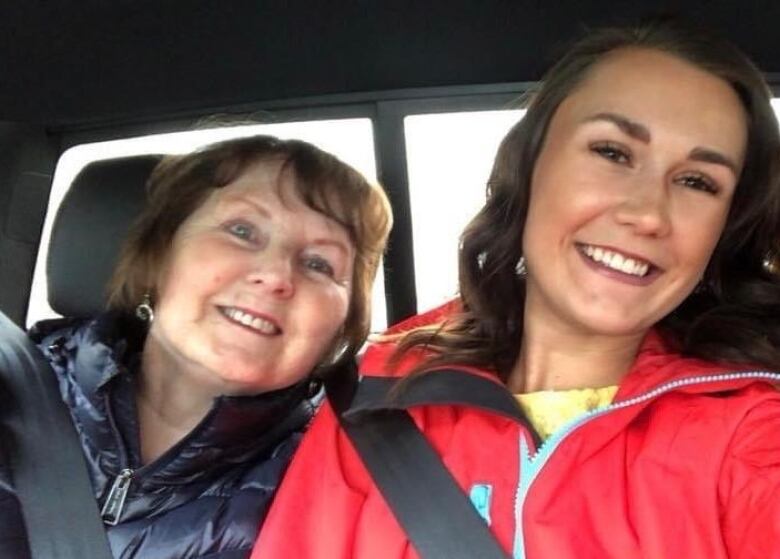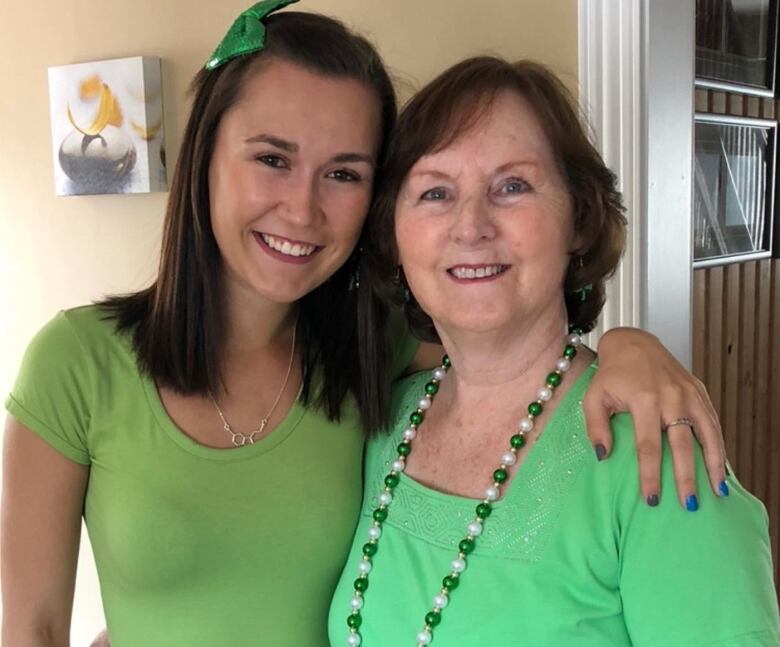COVID took Nanny away in January. The days since have been a lesson in grief
Unable to be with my grandmother or family, I am struggling with brutal emotions

This is a First Person column by Allison Stoodley, a marketing advisor in the energy industry. For more information about CBC's First Person stories, please see the FAQ.
A quick Google search tells me grief is defined as "deep sorrow, especially that caused by someone's death."
This winter, I've learned that grief is something you know nothing about until it hits you in the face, and you have no choice but to learn.
You learn it as you experience it. It's excruciating. Overwhelming. All-consuming. It takes control of your day.
Alice Antle (ne Malone) tested positive for COVID-19 in early January. The relentless, horrible virus robbed her from us on Jan. 16. She was 75.
Alice was my grandmother; I called her Nanny. She had four children and 10 grandchildren. She absolutely loved bingo, Hallmark movies, green tea and spending time with her family.
The days of uncertainty leading up to losing her felt like a lifetime. Our lives came to a halt as we waited for news from her medical team, waited to talk with her on the phone, waited to see what was going to happen.
I live on the other side of the country from Nanny and the rest of our Newfoundland family. In a pre-pandemic world, I could have hopped on a plane to be there. However, we have still been living this nightmare of a pandemic, so it wasn't that simple, especially in the Omicron wave of early January.
On the night of Jan. 15, Nanny and I FaceTimed. I cried as she told me I'm going to be OK. I thanked her for everything she's ever done for me. She told me she fought so hard. We had a few minutes, and they were truly special.
Ten hours later, she was gone.
That's when the grief started. The shock. The upset stomach, the tears, the denial. The lack of appetite and sleep. The super-fast heartbeat.

I fully recognize grieving is difficult no matterwhat, where or when. But the perspective I am writing from is this: your grandmother (who doubled as a best friend, who you lived with for years) contracted a deadly virus and was taken from this world and her family in less than two weeks. You are on the other side of Canada. You can't be near all your other grieving family members.
You can't gather at your grandmother's house to dig through old photo albums. You can't hug your mom, who just lost her mom. You're struggling mentally with the fact your grandmother just spent 12 days in the hospital, without any visitors due to restrictions.
Grief doesn't care how hard you try
I did whatever I could to find strength. Nanny was a strong person and she exemplified that during her last days.
I wanted to be strong like her. I started her favourite TV show, This is Us, from the beginning. I made her cookies. I went for walks. I drank green tea. I journalled my feelings. I FaceTimed my family a lot.
I am moving forward, limping, with a piece of my life missing, but I know the worst hasn't even come yet.
I took time to be sad. I took time to focus on work; she was so proud of me and what I do, so I wanted to keep working.
But grief doesn't care how hard you try. It's still a process you have to face. You have to go through phases of immense emotions. You experience everything from shock to anger to guilt to extreme sadness. You think you're getting to a better place but suddenly you're back to Square 1.
You think the initial shock of losing someone is the most painful part, but it's not. The most pain comes when you see the urn and run to the bathroom because you think you may vomit. It comes when you cook their favourite meal and your first instinct is to call them.

It comes when you're trying sohard to pay attention in a meeting but all you can think is that they're gone. It comes when you try to sleep but your heart won't stop racing. You wake up drenched in sweat, when you realize this is reality now. It comes when you realize they won't be here for all the milestones to come, or it comes when you're folding laundry.
Figuring it out, a minute at a time
Navigating these waves of grief is the hardest thing I've had to learn. Nobody teaches you or prepares you for it. You just have to figure it out, minute by minute.
I am very much aware that as I crawl my way through this cloud of grief, I still haven't physically been home. I haven't been in St. John's and had to painfully notice her absence.
I am moving forward, limping, with a piece of my life missing, but I know the worst hasn't even come yet. I know grieving from a distance can give you a false sense of reality. I can trick my mind into thinking things are still the same at home. They aren't.

When I get off the plane in Newfoundland next time, her house won't be the first place I visit. She won't be the first person I hug. I won't get to open her front door and shout, "I'm baaaAaack!"
Home isn't the same home I left. There has been a huge change, a huge loss.
In This is Us, one of the characters says that if he dies, all he wants is for his family to be OK. That's the word he used "OK." I reflected on my last words with Nanny and how she said, "You will be OK."
In a time like this, when you lose someone you loved so much, being OK is all we can ask for.
So if you ask how I'm doing today, I'm OK.













_(720p).jpg)


 OFFICIAL HD MUSIC VIDEO.jpg)
.jpg)



























































































